Detailed Analysis: Accounting for Income Tax - Finance Module
VerifiedAdded on 2020/03/02
|10
|824
|32
Homework Assignment
AI Summary
This assignment addresses the principles of accounting for income tax, focusing on Australian tax regulations. The solution begins by examining the treatment of various expenses like insurance and entertainment costs under current tax laws, including GST implications. It then presents a current tax worksheet detailing calculations to arrive at taxable income and current tax liability. The assignment includes journal entries for current tax and a comprehensive deferred tax worksheet, outlining temporary differences and the calculation of deferred tax assets and liabilities. Finally, the document provides journal entries related to changes in tax. The assignment covers key aspects of tax accounting, including the application of accounting principles to calculate income tax liabilities and assets.
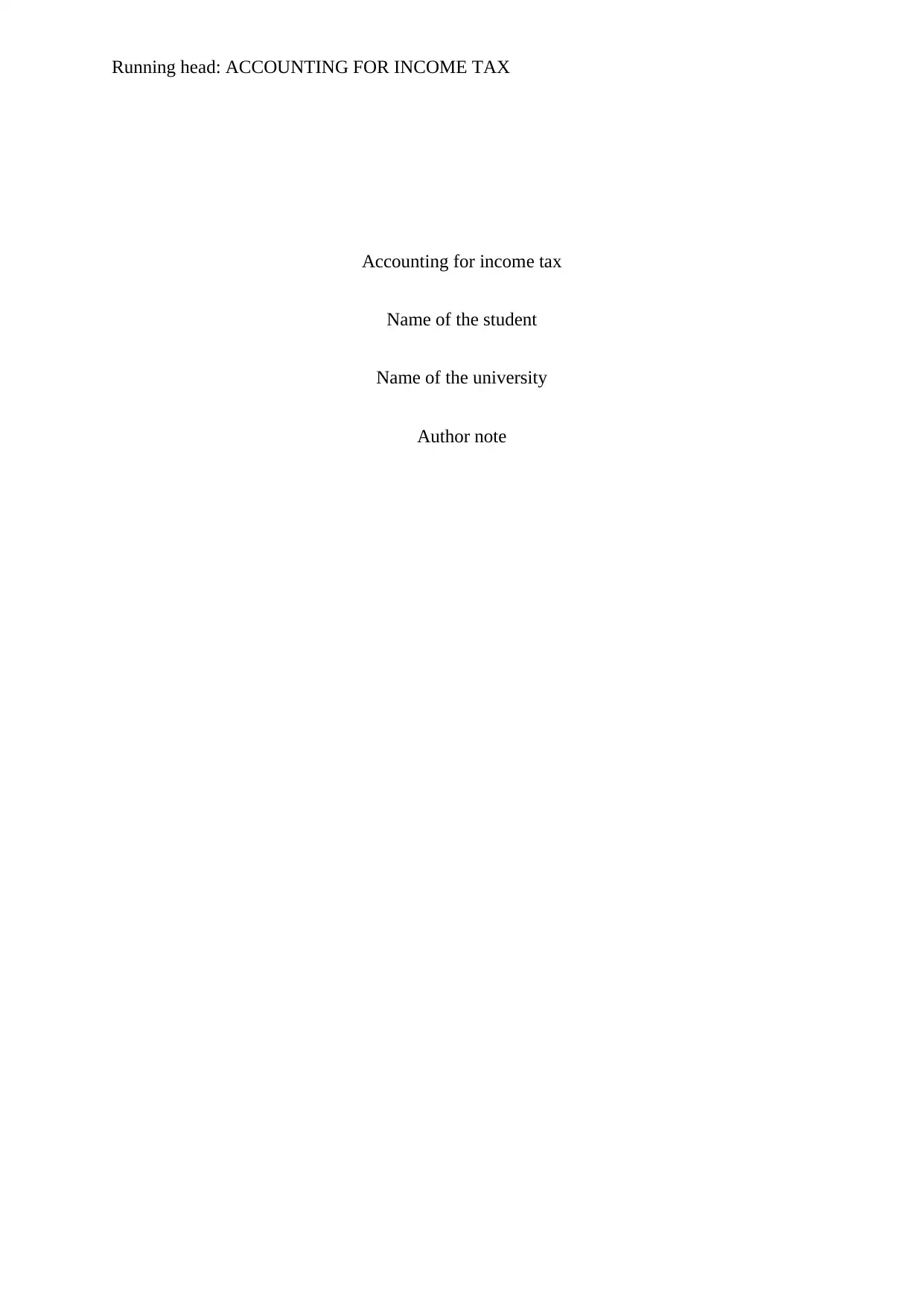
Running head: ACCOUNTING FOR INCOME TAX
Accounting for income tax
Name of the student
Name of the university
Author note
Accounting for income tax
Name of the student
Name of the university
Author note
Paraphrase This Document
Need a fresh take? Get an instant paraphrase of this document with our AI Paraphraser
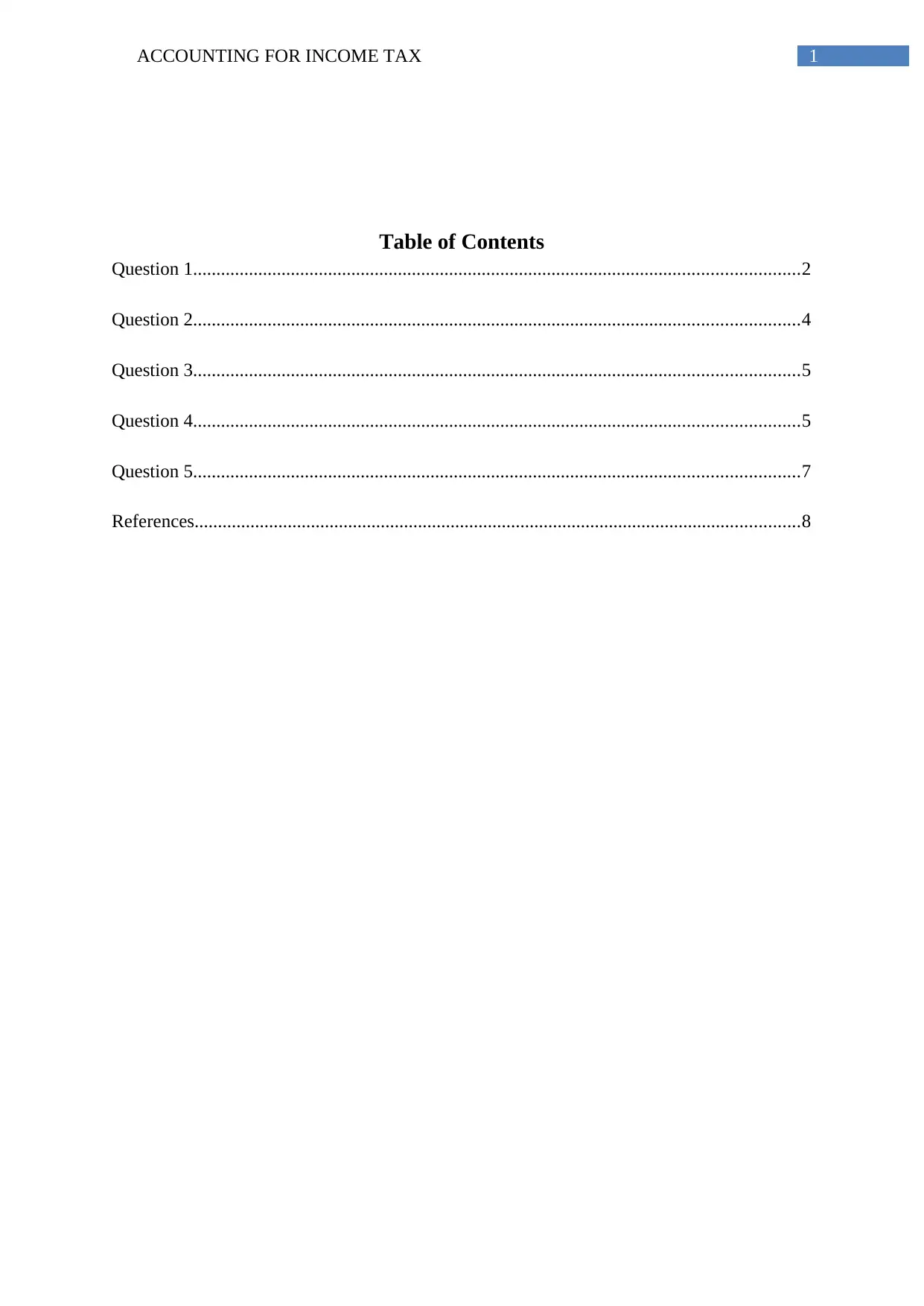
1ACCOUNTING FOR INCOME TAX
Table of Contents
Question 1..................................................................................................................................2
Question 2..................................................................................................................................4
Question 3..................................................................................................................................5
Question 4..................................................................................................................................5
Question 5..................................................................................................................................7
References..................................................................................................................................8
Table of Contents
Question 1..................................................................................................................................2
Question 2..................................................................................................................................4
Question 3..................................................................................................................................5
Question 4..................................................................................................................................5
Question 5..................................................................................................................................7
References..................................................................................................................................8
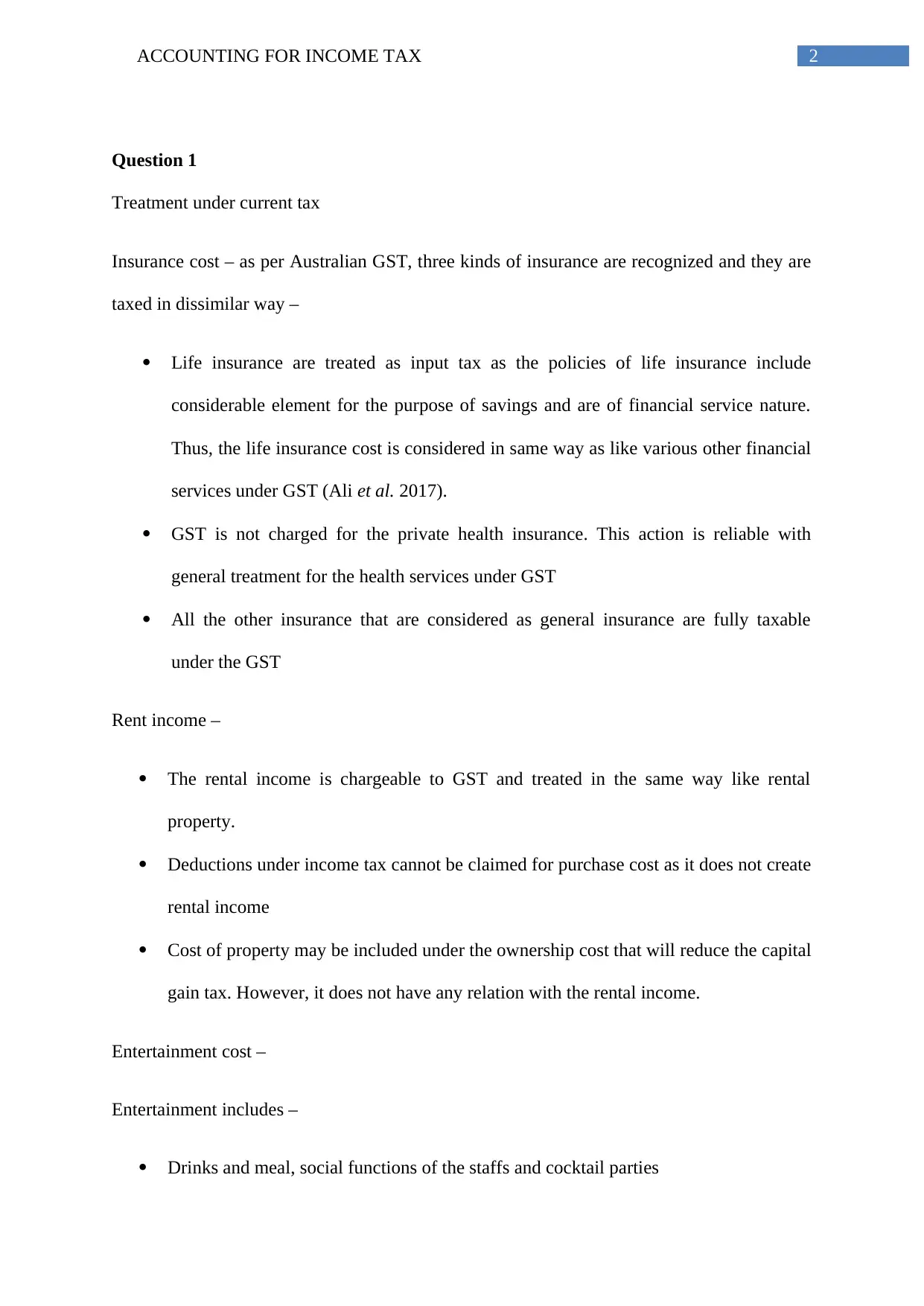
2ACCOUNTING FOR INCOME TAX
Question 1
Treatment under current tax
Insurance cost – as per Australian GST, three kinds of insurance are recognized and they are
taxed in dissimilar way –
Life insurance are treated as input tax as the policies of life insurance include
considerable element for the purpose of savings and are of financial service nature.
Thus, the life insurance cost is considered in same way as like various other financial
services under GST (Ali et al. 2017).
GST is not charged for the private health insurance. This action is reliable with
general treatment for the health services under GST
All the other insurance that are considered as general insurance are fully taxable
under the GST
Rent income –
The rental income is chargeable to GST and treated in the same way like rental
property.
Deductions under income tax cannot be claimed for purchase cost as it does not create
rental income
Cost of property may be included under the ownership cost that will reduce the capital
gain tax. However, it does not have any relation with the rental income.
Entertainment cost –
Entertainment includes –
Drinks and meal, social functions of the staffs and cocktail parties
Question 1
Treatment under current tax
Insurance cost – as per Australian GST, three kinds of insurance are recognized and they are
taxed in dissimilar way –
Life insurance are treated as input tax as the policies of life insurance include
considerable element for the purpose of savings and are of financial service nature.
Thus, the life insurance cost is considered in same way as like various other financial
services under GST (Ali et al. 2017).
GST is not charged for the private health insurance. This action is reliable with
general treatment for the health services under GST
All the other insurance that are considered as general insurance are fully taxable
under the GST
Rent income –
The rental income is chargeable to GST and treated in the same way like rental
property.
Deductions under income tax cannot be claimed for purchase cost as it does not create
rental income
Cost of property may be included under the ownership cost that will reduce the capital
gain tax. However, it does not have any relation with the rental income.
Entertainment cost –
Entertainment includes –
Drinks and meal, social functions of the staffs and cocktail parties
⊘ This is a preview!⊘
Do you want full access?
Subscribe today to unlock all pages.

Trusted by 1+ million students worldwide
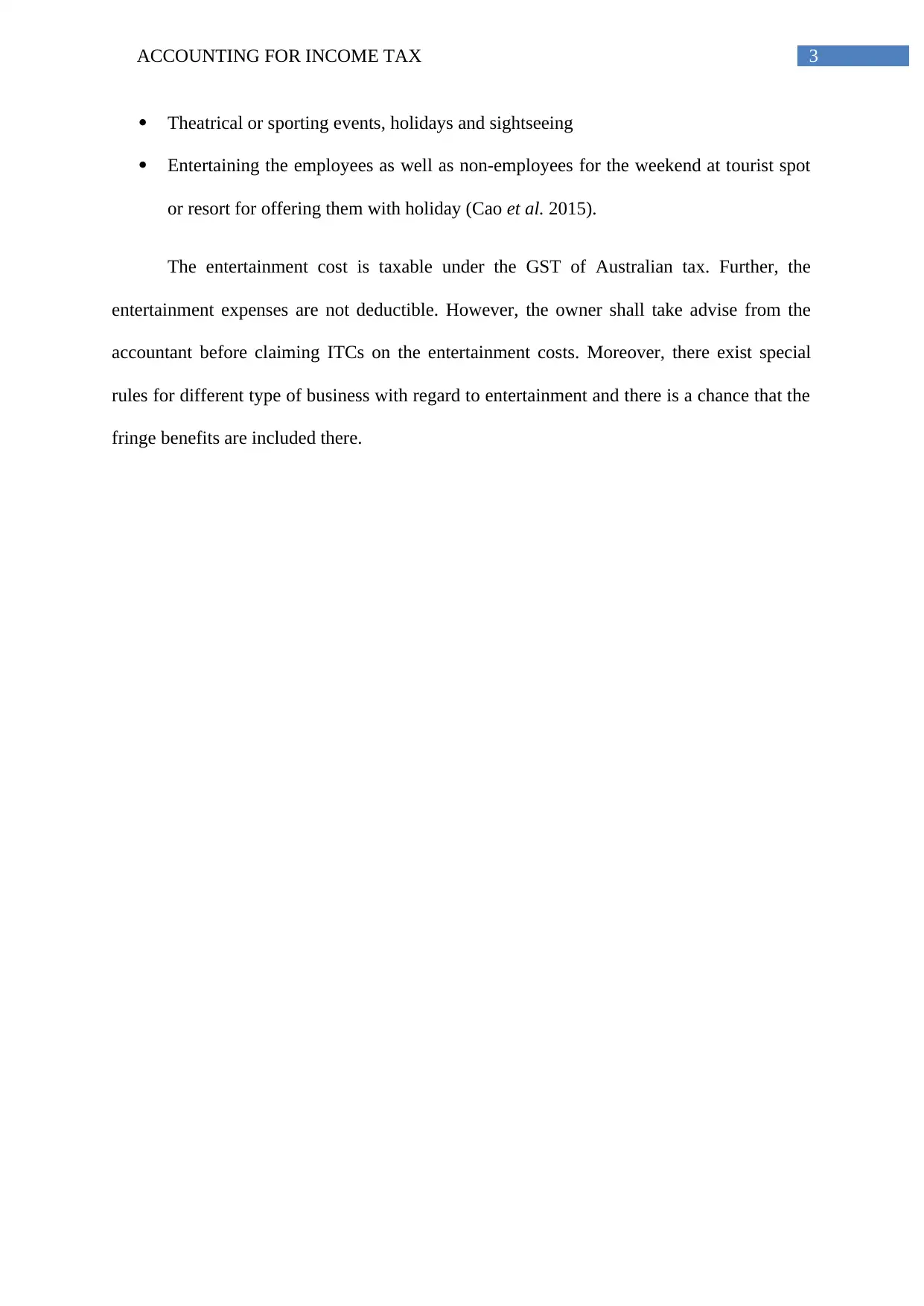
3ACCOUNTING FOR INCOME TAX
Theatrical or sporting events, holidays and sightseeing
Entertaining the employees as well as non-employees for the weekend at tourist spot
or resort for offering them with holiday (Cao et al. 2015).
The entertainment cost is taxable under the GST of Australian tax. Further, the
entertainment expenses are not deductible. However, the owner shall take advise from the
accountant before claiming ITCs on the entertainment costs. Moreover, there exist special
rules for different type of business with regard to entertainment and there is a chance that the
fringe benefits are included there.
Theatrical or sporting events, holidays and sightseeing
Entertaining the employees as well as non-employees for the weekend at tourist spot
or resort for offering them with holiday (Cao et al. 2015).
The entertainment cost is taxable under the GST of Australian tax. Further, the
entertainment expenses are not deductible. However, the owner shall take advise from the
accountant before claiming ITCs on the entertainment costs. Moreover, there exist special
rules for different type of business with regard to entertainment and there is a chance that the
fringe benefits are included there.
Paraphrase This Document
Need a fresh take? Get an instant paraphrase of this document with our AI Paraphraser
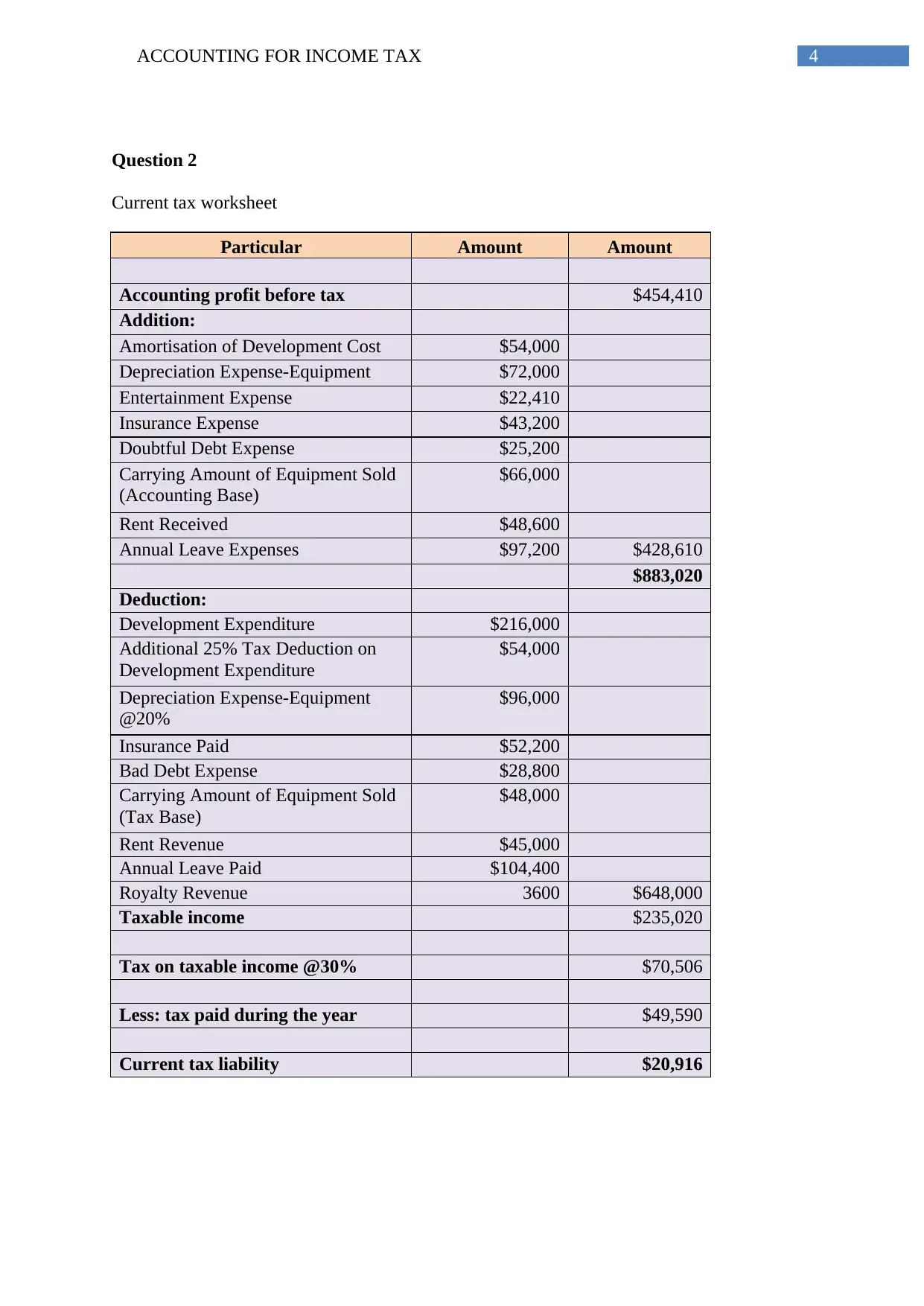
4ACCOUNTING FOR INCOME TAX
Question 2
Current tax worksheet
Particular Amount Amount
Accounting profit before tax $454,410
Addition:
Amortisation of Development Cost $54,000
Depreciation Expense-Equipment $72,000
Entertainment Expense $22,410
Insurance Expense $43,200
Doubtful Debt Expense $25,200
Carrying Amount of Equipment Sold
(Accounting Base)
$66,000
Rent Received $48,600
Annual Leave Expenses $97,200 $428,610
$883,020
Deduction:
Development Expenditure $216,000
Additional 25% Tax Deduction on
Development Expenditure
$54,000
Depreciation Expense-Equipment
@20%
$96,000
Insurance Paid $52,200
Bad Debt Expense $28,800
Carrying Amount of Equipment Sold
(Tax Base)
$48,000
Rent Revenue $45,000
Annual Leave Paid $104,400
Royalty Revenue 3600 $648,000
Taxable income $235,020
Tax on taxable income @30% $70,506
Less: tax paid during the year $49,590
Current tax liability $20,916
Question 2
Current tax worksheet
Particular Amount Amount
Accounting profit before tax $454,410
Addition:
Amortisation of Development Cost $54,000
Depreciation Expense-Equipment $72,000
Entertainment Expense $22,410
Insurance Expense $43,200
Doubtful Debt Expense $25,200
Carrying Amount of Equipment Sold
(Accounting Base)
$66,000
Rent Received $48,600
Annual Leave Expenses $97,200 $428,610
$883,020
Deduction:
Development Expenditure $216,000
Additional 25% Tax Deduction on
Development Expenditure
$54,000
Depreciation Expense-Equipment
@20%
$96,000
Insurance Paid $52,200
Bad Debt Expense $28,800
Carrying Amount of Equipment Sold
(Tax Base)
$48,000
Rent Revenue $45,000
Annual Leave Paid $104,400
Royalty Revenue 3600 $648,000
Taxable income $235,020
Tax on taxable income @30% $70,506
Less: tax paid during the year $49,590
Current tax liability $20,916
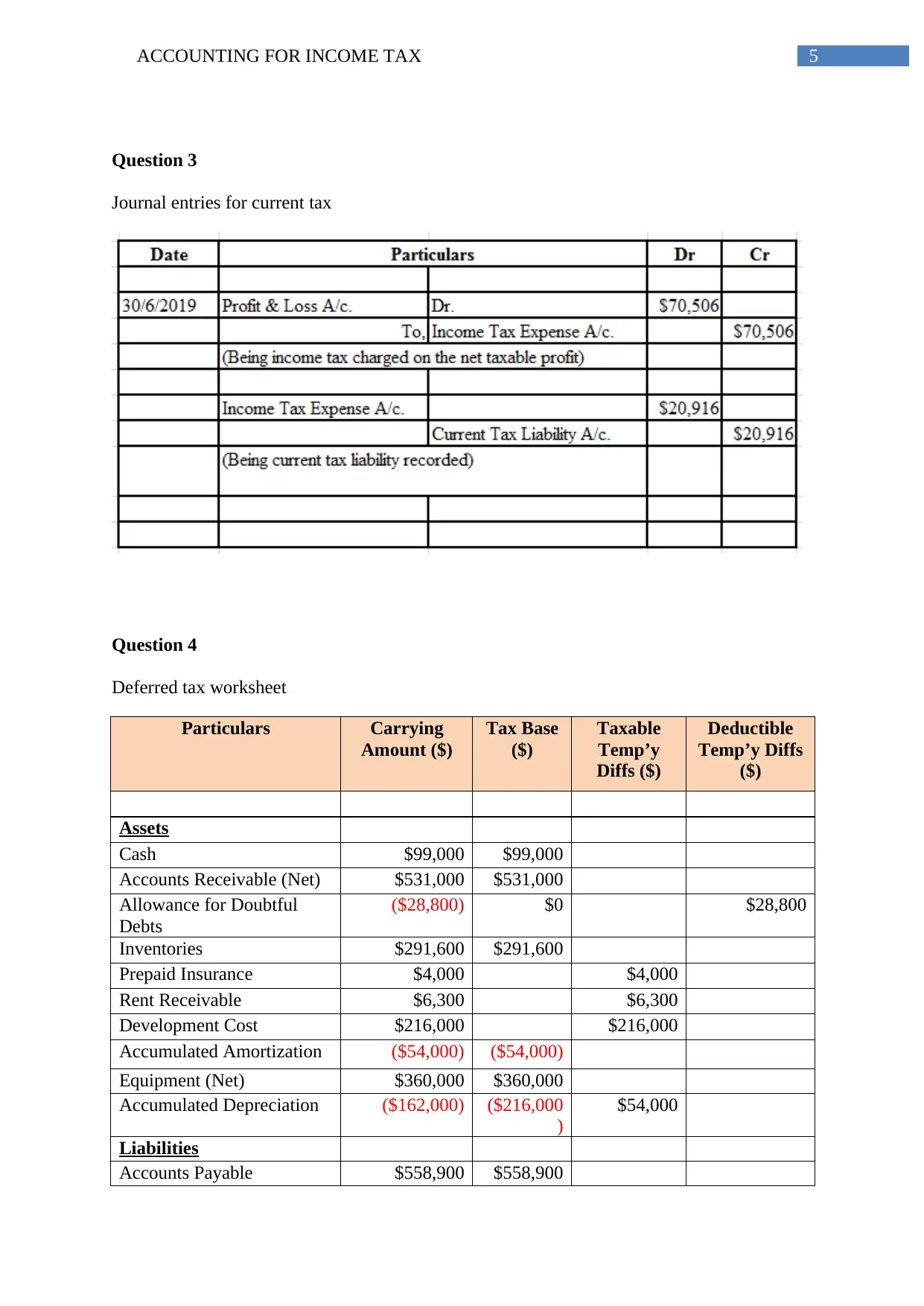
5ACCOUNTING FOR INCOME TAX
Question 3
Journal entries for current tax
Question 4
Deferred tax worksheet
Particulars Carrying
Amount ($)
Tax Base
($)
Taxable
Temp’y
Diffs ($)
Deductible
Temp’y Diffs
($)
Assets
Cash $99,000 $99,000
Accounts Receivable (Net) $531,000 $531,000
Allowance for Doubtful
Debts
($28,800) $0 $28,800
Inventories $291,600 $291,600
Prepaid Insurance $4,000 $4,000
Rent Receivable $6,300 $6,300
Development Cost $216,000 $216,000
Accumulated Amortization ($54,000) ($54,000)
Equipment (Net) $360,000 $360,000
Accumulated Depreciation ($162,000) ($216,000
)
$54,000
Liabilities
Accounts Payable $558,900 $558,900
Question 3
Journal entries for current tax
Question 4
Deferred tax worksheet
Particulars Carrying
Amount ($)
Tax Base
($)
Taxable
Temp’y
Diffs ($)
Deductible
Temp’y Diffs
($)
Assets
Cash $99,000 $99,000
Accounts Receivable (Net) $531,000 $531,000
Allowance for Doubtful
Debts
($28,800) $0 $28,800
Inventories $291,600 $291,600
Prepaid Insurance $4,000 $4,000
Rent Receivable $6,300 $6,300
Development Cost $216,000 $216,000
Accumulated Amortization ($54,000) ($54,000)
Equipment (Net) $360,000 $360,000
Accumulated Depreciation ($162,000) ($216,000
)
$54,000
Liabilities
Accounts Payable $558,900 $558,900
⊘ This is a preview!⊘
Do you want full access?
Subscribe today to unlock all pages.

Trusted by 1+ million students worldwide
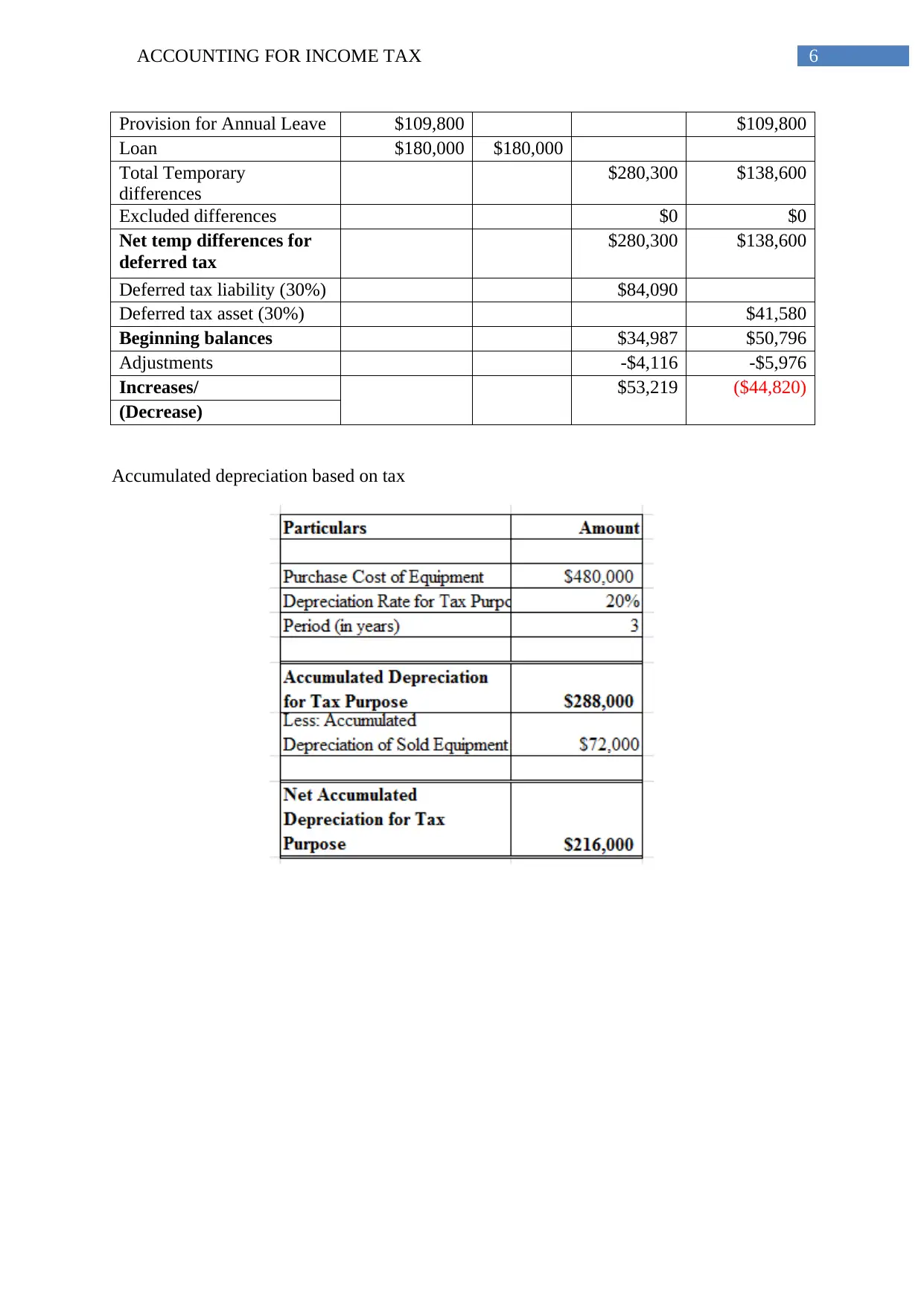
6ACCOUNTING FOR INCOME TAX
Provision for Annual Leave $109,800 $109,800
Loan $180,000 $180,000
Total Temporary
differences
$280,300 $138,600
Excluded differences $0 $0
Net temp differences for
deferred tax
$280,300 $138,600
Deferred tax liability (30%) $84,090
Deferred tax asset (30%) $41,580
Beginning balances $34,987 $50,796
Adjustments -$4,116 -$5,976
Increases/ $53,219 ($44,820)
(Decrease)
Accumulated depreciation based on tax
Provision for Annual Leave $109,800 $109,800
Loan $180,000 $180,000
Total Temporary
differences
$280,300 $138,600
Excluded differences $0 $0
Net temp differences for
deferred tax
$280,300 $138,600
Deferred tax liability (30%) $84,090
Deferred tax asset (30%) $41,580
Beginning balances $34,987 $50,796
Adjustments -$4,116 -$5,976
Increases/ $53,219 ($44,820)
(Decrease)
Accumulated depreciation based on tax
Paraphrase This Document
Need a fresh take? Get an instant paraphrase of this document with our AI Paraphraser
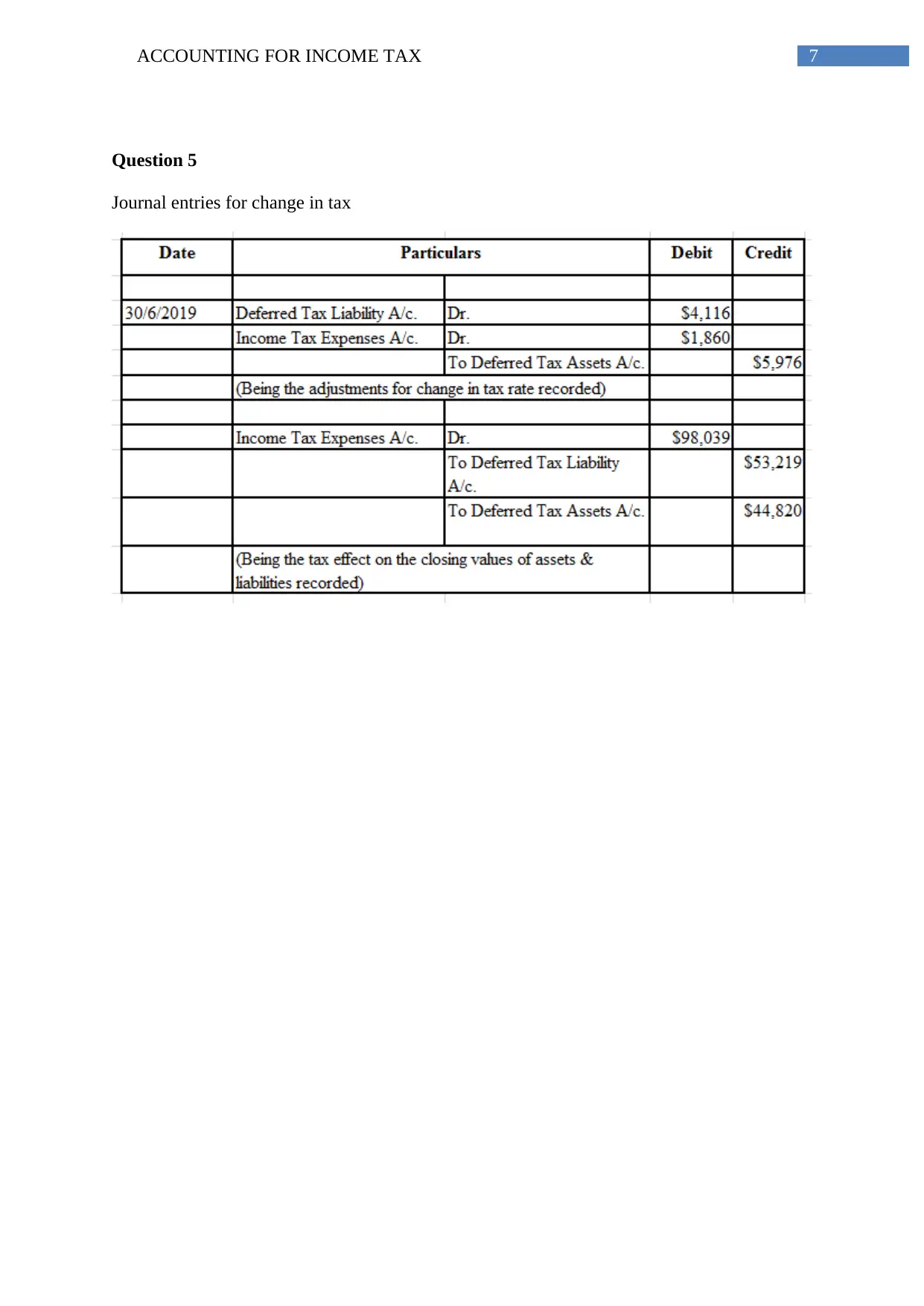
7ACCOUNTING FOR INCOME TAX
Question 5
Journal entries for change in tax
Question 5
Journal entries for change in tax
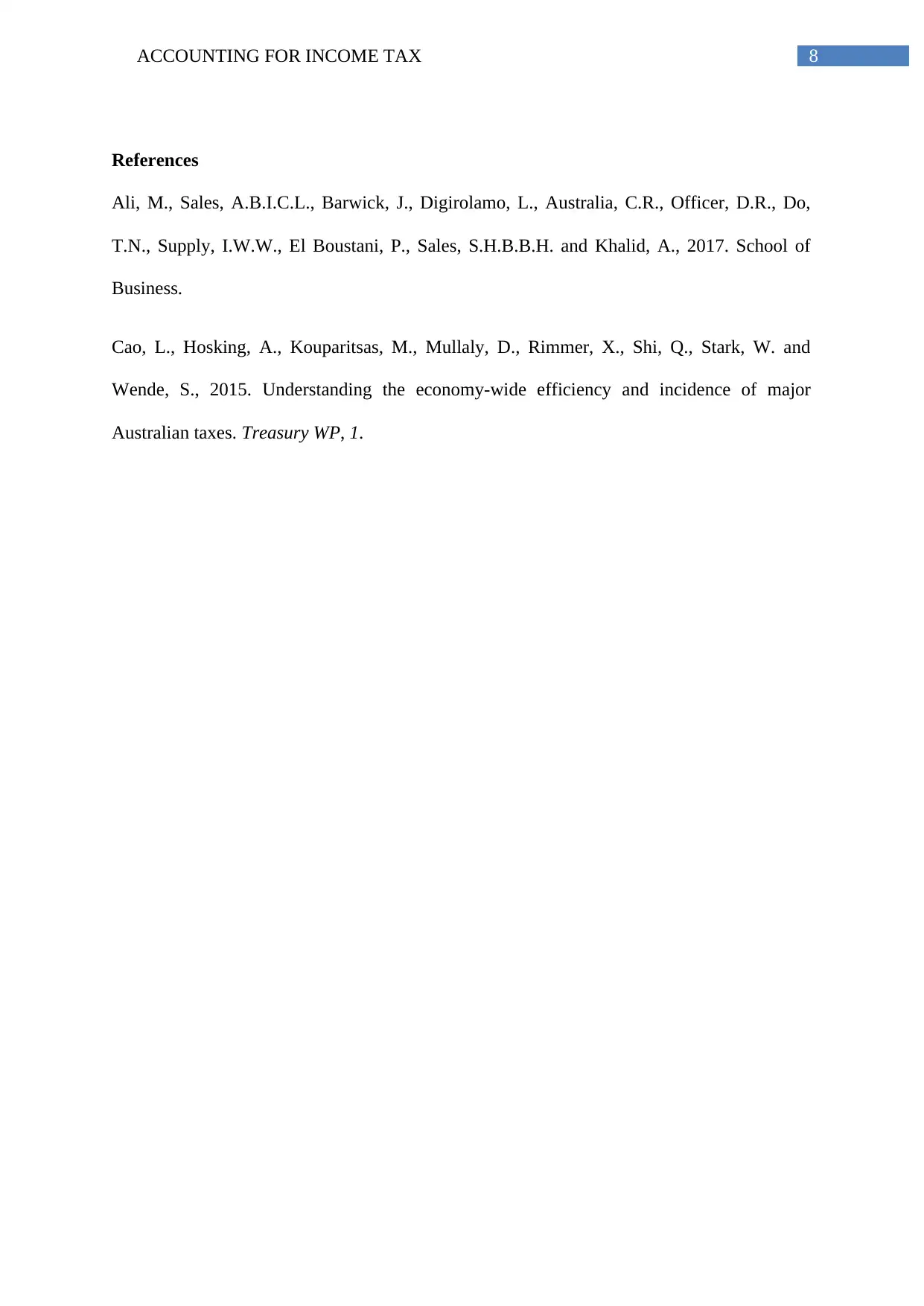
8ACCOUNTING FOR INCOME TAX
References
Ali, M., Sales, A.B.I.C.L., Barwick, J., Digirolamo, L., Australia, C.R., Officer, D.R., Do,
T.N., Supply, I.W.W., El Boustani, P., Sales, S.H.B.B.H. and Khalid, A., 2017. School of
Business.
Cao, L., Hosking, A., Kouparitsas, M., Mullaly, D., Rimmer, X., Shi, Q., Stark, W. and
Wende, S., 2015. Understanding the economy-wide efficiency and incidence of major
Australian taxes. Treasury WP, 1.
References
Ali, M., Sales, A.B.I.C.L., Barwick, J., Digirolamo, L., Australia, C.R., Officer, D.R., Do,
T.N., Supply, I.W.W., El Boustani, P., Sales, S.H.B.B.H. and Khalid, A., 2017. School of
Business.
Cao, L., Hosking, A., Kouparitsas, M., Mullaly, D., Rimmer, X., Shi, Q., Stark, W. and
Wende, S., 2015. Understanding the economy-wide efficiency and incidence of major
Australian taxes. Treasury WP, 1.
⊘ This is a preview!⊘
Do you want full access?
Subscribe today to unlock all pages.

Trusted by 1+ million students worldwide

9ACCOUNTING FOR INCOME TAX
1 out of 10
Related Documents
Your All-in-One AI-Powered Toolkit for Academic Success.
+13062052269
info@desklib.com
Available 24*7 on WhatsApp / Email
![[object Object]](/_next/static/media/star-bottom.7253800d.svg)
Unlock your academic potential
Copyright © 2020–2025 A2Z Services. All Rights Reserved. Developed and managed by ZUCOL.





